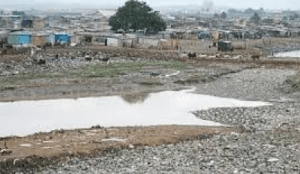UK researchers search for solutions to lagoon pollution in Ghana
 A team of researchers from the University of Portsmouth’s School of Civil Engineering and Surveying, have commenced work into finding solutions that could influence state policy in the ever-increasing pollution of coastal lagoons in Ghana.
A team of researchers from the University of Portsmouth’s School of Civil Engineering and Surveying, have commenced work into finding solutions that could influence state policy in the ever-increasing pollution of coastal lagoons in Ghana.
They were in the country to fact-find and network with colleague researchers and related institutions for possible partnerships, believing that the final result could influence public health.
Their study is dubbed: “The Impact of Climate Change on Anthropogenically Polluted Coastal Lagoons in Africa: Case Study of Ghana.”
The Department of Marines and Fisheries Sciences of the University of Ghana, Legon, and the Geography and Regional Planning Department of the University of Cape Coast, are the collaborating institutions.
Lagoons are polluted with liquid waste, solid waste from the mainland including plastics, bottles, polythene and sewage particles and industrial waste laden with heavy metals.
Coastal zones represent less than seven per cent of total land area and hold more than 25 per cent of the nation’s population.
Speaking to the Ghana News Agency in an interview, Dr Isaac Boateng, Leader of the team said climate change with its associated impact may aggravate the situation as increases in temperature, sea levels and intensity of storms are factors that could affect coastal lagoons significantly.
He indicated that coastal lagoon systems in Africa, like goods and services, generate in excess of $500 billion annually including services in the fishing industry, spawning grounds, tourism and mangroves.
The team would be investigating the extent of coastal lagoon pollution, effects of pollution on lagoons and ecosystems, settlements and livelihood patterns as well as the resilience capacity of the lagoon ecosystems.
Dr Boateng indicated that preliminary investigations attest to the hypothesis that coastal lagoons including Sakumono, Moquaye, Kpeshie, Bortianor, Fete and Winneba are heavily polluted.
The team leader said policy actors need to support the project in terms of funding towards adopting recommendations, particularly banning of plastic bottles and polythene bags, which are not bio-degradable.
The continual trends of drift from rural to urban centres, the industrialisation of coastal districts as well as high population growth rate of three per cent place increasing stress on lagoons and coastal ecosystems in Ghana.
The methodology to be deployed include measurement of levels of pollution, analysis of the geomorphology of lagoons and use of sea level rise model data to develop, recommend and predict strategies for the sustainable management of the problem.
The expected outcomes are to develop a baseline understanding of the impact of climate change on polluted coastal lagoons, enhance the development of mitigation and adaptation strategies in Ghana and possible scaling-up and projection of the findings on coastal lagoons in the West African sub-region.
Source: GNA
